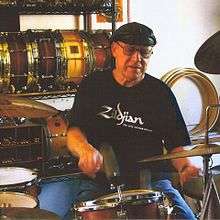Buddy Deppenschmidt

Buddy (William Henry) Deppenschmidt (born February 16, 1936, Philadelphia, Pa.) is an American jazz drummer. He recorded the seminal album, Jazz Samba, with Stan Getz, Charlie Byrd, Keter Betts, Joe (Gene) Byrd and Bill Reichenbach.
Career
Buddy's father, a saxophone player, led his own orchestra under the name Buddy Williams[1] after playing with and arranging for Paul Whiteman, Jimmy and Tommy Dorsey and Glenn Miller. When he was four, Buddy Deppenschmidt and his mother moved to Richmond, Virginia. Self-taught, he started playing drums professionally while in his teens and then went on the road with Ronnie Bartley's Orchestra, a territory band which travelled all over the western U.S. Back in Richmond, he played with many local bands and then became the drummer for the Newton Thomas Trio (1954–59) which was also the rhythm section for the Billy Butterfield Quintet. The trio toured with Butterfield throughout the northeast and midwest U.S. (1958–59) [2] When the Newton Thomas Trio played the Virginia Beach Jazz Festival they received rave reviews on a bill that included the Dave Brubeck Quartet and the Charlie Byrd Trio. Two nights later, Charlie Byrd came into the Jolly Roger, the jazz club where Buddy was playing, and offered him the job as drummer with his trio, which Buddy accepted.[3] He played with the trio at the Showboat Lounge in Washington, D.C. from 1959–62
Starting in February 1961, the Charlie Byrd Trio, Charlie Byrd, guitar, Keter Betts, bass, and Buddy Deppenschmidt, drums, toured South America, Central America and Mexico on a good will tour sponsored by the U.S. State Department. This three-month cultural exchange included eighteen countries. While in Brazil, Buddy spent his free time with local musicians, teaching them American jazz styles and learning from them the specific bossa nova rhythms which he then mastered and brought back. It was his idea to do an album combining jazz and bossa nova and to bring Stan Getz, one of his idols, in on the project.[3] Jazz Samba was recorded live in less than three hours on February 13, 1962 and started a bossa nova craze both nationally and internationally. It is the only jazz album to be number one on both the jazz and pop Billboard charts[3] and it remained high on the charts for 70 weeks. Desafinado, the hit single from the album, was inducted into the Grammy Hall of Fame in 2000 and the entire album was inducted into the Grammy Hall of Fame in 2010. The details of these events are well documented in the Jazz Times cover article Give The Drummer Some, by jazz scholar David Adler.[3]
After Charlie Byrd, Deppenschmidt joined the Tee Carson Trio (1963–64) performing at the renowned Marquis Lounge at the Shoreham Hotel in D.C. where they shared the bill with political satirist, Mark Russell. He then relocated to Bucks County, Pa. and formed his own band, Jazz Renaissance, playing nightclubs, concerts and festivals with varying personnel and instrumentation.[1] He was also the drummer with the John Coates Trio (1964–78). He toured the midwest and west coast with classically trained jazz piano virtuoso, Bernard Peiffer's trio (1967). From 1970-73 he studied with the legendary Joe Morello. Buddy Deppenschmidt has taught tens of thousands of students in his long and still active teaching career. His work has been transcribed in Modern Drummer Magazine and Creative Coordination for the Modern Drummer by Keith Copeland. (Carl Fisher 1986) He has biographical listings in The Encyclopedia of Jazz in the Sixties and The New Grove Dictionary of Jazz.
His drum work can be heard on the soundtracks of the following movies: A Thousand Clowns (1965), Wall Street (1987), Bossa Nova (2000), The Lake House (2006), and Whatever Works (2009)
In his long career, Buddy Deppenschmidt has played with most of the jazz greats including: Mose Allison, Chet Baker, Keter Betts, Billy Butterfield, Charlie Byrd, John Coates, Jr., Al Cohn, Matt Dennis, Bob Dorough, Herb Ellis, Tal Farlow, Stan Getz, Al Haig, Lionel Hampton, Barry Harris, Coleman Hawkins, Milt Hinton, Shirley Horn, J.J. Johnson, Larry Mc Kenna, James Moody, King Pleasure, Maxine Sullivan, Clark Terry, Joe Venuti and Phil Woods.
Discography
Charlie Byrd in Greenwich Village (Milestone) Latin Byrd (Milestone) Guitar Guitar (Wounded Bird) Bossa Nova Pelos Pessaros (Riverside)
- The Guitar Artistry of Charlie Byrd (Riverside, 1960)
- Charlie Byrd at the Village Vanguard (Riverside, 1961)
- Blues Sonata (Riverside, 1961)
- Jazz Samba (Verve, 1962)
- Latin Impressions (Riverside, 1962)
- Once More! Charlie Byrd's Bossa Nova (Riverside, 1963)
and at least 35 recompilations on various labels
Notes
- 1 2 Kernfeld, Barry (1988, 1991) The New Grove Dictionary of Jazz (4th. Ed). St. Martins Press, New York. p. 284 ISBN 0-333-63231-1
- ↑ Feather, Leonard (1966). The Encyclopedia of Jazz in the Sixties (3rd. ed.) Horizon Press, New York. p. 107 ISBN 0-8180-1205-6
- 1 2 3 4 Adler, David (June 2004). "Give The Drummer Some". Jazz Times p. 66-74.
References
- Adler, David (June 2004). "Give The Drummer Some". Jazz Times p. 66-74.
- Josmar Lopes (November 9, 2011) Well I'll be Damned!, The Drummer Was Right After All! Brazzil
- Chris Richards ( April 19, 2012) Jazz Samba Turns 50, The Washington Post
- Chris Mc Gowan (4/17/2012) Blame it on the Bossa Nova: Jazz Samba's 50th. Birthday, The Huffington Post
- Josmar Lopes (March 30, 2013) Buddy Deppenschmidt: The Man Who Drummed the Brazilian Beat into American Ears!
- Chris Mc Gowan (April 24, 2013) Another Side of Jazz Samba: An Interview with Buddy Deppenschmidt: The Brazilian Sound
- Kernfeld, Barry (1988, 1991) The New Grove Dictionary of Jazz (4th. Ed). St. Martins Press, New York. p. 284 ISBN 0-333-63231-1
- Feather, Leonard (1966). The Encyclopedia of Jazz in the Sixties (3rd. ed.) Horizon Press, New York. p. 107 ISBN 0-8180-1205-6
External links
- Panel Discussion: The Jazz Samba Project, The Strathmore Music and Arts Center, Bethesda, Md. (2014)